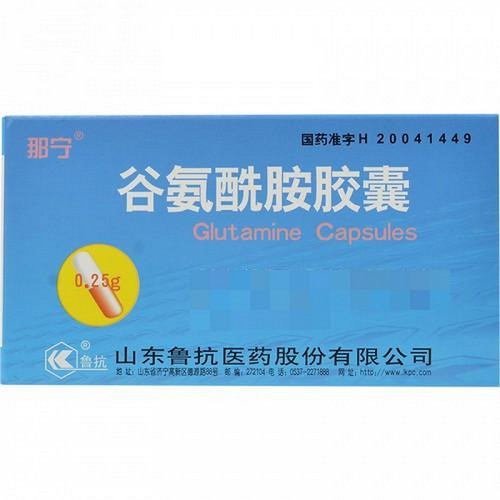Product Overview
[Drug Name]
Generic Name: Glutamine Capsules
Trade Name: Daweian Glutamine Capsules 0.25g*24 Capsules
Pinyin Code: DaWeiAn GuAnZuoAnJiaoNang 0.25g*24Li
[Main Ingredients]
Main Ingredient: L-Glutamine, Chemical Name: L-2-Aminoglutaric acid amide.
[Properties]
This product consists of white or off-white fine granules.
[Indications/Main Functions]
Used to improve gastric and duodenal ulcers.
[Specifications]
0.25g*24 Capsules
[Dosage and Administration]
Oral administration: 2 capsules (0.5g) 3-4 times daily, or as directed by a physician.
[Adverse Reactions]
Consumption, diarrhea, and occasional stomach discomfort may occur; generally, no special treatment is required.
[Contraindications]
Allergies to any of the ingredients in this product are recommended.
[Drug Interactions]
This product does not affect the metabolism of other drugs.
[Precautions]
1. This product is an amino acid drug. Overdose can cause kidney damage in patients with chronic renal failure. Therefore, patients taking glutamine in this setting must be under close medical supervision.
2. Glutamine increases intestinal absorption of sodium and chloride, which in turn increases intestinal water absorption. This is beneficial for patients with diarrhea, but it may harden stools and cause constipation in patients without diarrhea. Long-term use of this drug requires patients to increase their intake of high-fiber foods and drink plenty of fluids.
3. Glutamine is not suitable for patients with severe liver disease. In patients with severe cirrhosis or other metabolic diseases, increased blood ammonia can induce hepatic encephalopathy or even hepatic coma.
4. This drug is decomposed and destroyed at high temperatures. Therefore, glutamine must be taken at room temperature or with cold food or beverages. It should not be mixed with heated or acidic foods.
[Pediatric Use]
This study has not been conducted and no reliable references are available.
[Use in Elderly Patients]
This study has not been conducted and no reliable references are available.
[Overdose]
Unclear.
[Pharmacology and Toxicology]
In vitro studies have shown that glutamine has protective and repairing effects on gastrointestinal mucosal damage. This is due to its ability to promote the biochemical synthesis of glucosamine and glucosamine, components of the gastrointestinal mucosal epithelium. In studies of rats with pyloric ligation, oral administration of glutamine has been shown to inhibit ulcers caused by aspirin and indomethacin.








